|
|
|
Sort Order |
|
|
|
Items / Page
|
|
|
|
|
|
|
| Srl | Item |
| 1 |
ID:
181187
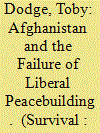

|
|
|
|
|
| Summary/Abstract |
The collapse of the US-aligned Afghan government and the seizure of Kabul by the Taliban in 2021 as the United States withdrew its forces was ultimately caused by a change in US government policy in June 2003. At that point, the George W. Bush administration dropped its aversion to state-building and its plan for a limited intervention designed to rid the country of al-Qaeda and the Taliban. The US instead undertook an extended exercise in liberal peacebuilding, involving the creation of an institutionally and coercively powerful centralised Afghan state and a liberal-democratic system. This enterprise was inherently misconceived, largely ignoring Afghan history and culture, as well as the limitations of the US and its partners. The painful experience of the past 18 years indicates that liberal peacebuilding, at least along the lines of the US-led effort in Afghanistan, should not be attempted again.
|
|
|
|
|
|
|
|
|
|
|
|
|
|
|
|
| 2 |
ID:
052314
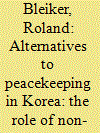

|
|
|
|
|
| Publication |
Spring 2004.
|
| Summary/Abstract |
Korea is one of the world's most volatile areas, not least because traditional UN mediation and peacekeeping missions are impossible. Having intervened in the Korean War on behalf of the southern side, the UN is a party to the conflict, rather than a neutral arbiter. The situation is particularly problematic because political interactions are characterized by a high degree of state-control over security policy. In both parts of the peninsula the state has, at least until recently, exercised the exclusive right to deal with the opponent on the other side of the hermetically divided peninsula. Given these domestic and international constrains, alternative approaches to conflict resolution are urgently needed. The recently proliferating literature on human security offers possible solutions, for it urges policy makers to view security beyond the conventional military-based defence of the state and its territory. Using such a conceptual framework, the essay assesses the potential significance non-state interactions between North and South, particularly those that promote communication, information exchange and face-to-face encounters. Even though these interactions remain limited, they are of crucial importance, for they provide an opportunity to reduce the stereotypical threat images that continue to fuel conflict on the peninsula.
|
|
|
|
|
|
|
|
|
|
|
|
|
|
|
|
| 3 |
ID:
094689


|
|
|
|
|
| Publication |
2010.
|
| Summary/Abstract |
What explains the effect of external intervention on the duration of civil war? The literature on intervention has made some progress in addressing this question, but it has been hindered by an assumption that states intervene in civil wars either to help one side win or to facilitate negotiations. Often, however, external states become involved in civil war to pursue an agenda which is separate from the goals of the internal combatants. When states intervene in this fashion, they make wars more difficult to resolve for two reasons. First, doing so introduces another actor that must approve any settlement to end the war. Second, external states generally have less incentive to negotiate than internal actors because they bear lower costs of fighting and they can anticipate gaining less benefit from negotiation than domestic insurgents. Through Cox regressions using data on the goals of all interventions in civil wars since World War II, this article shows that when states intervene with an independent agenda, they make wars substantially longer. The effect of independent interventions is much larger than that of external interventions generally, suggesting that the established finding that external interventions prolong civil war is driven by a subset of cases where states have intervened in conflicts to pursue independent goals.
|
|
|
|
|
|
|
|
|
|
|
|
|
|
|
|
| 4 |
ID:
156756
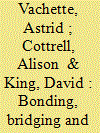

|
|
|
|
|
| Summary/Abstract |
Cyclone Pam (March 2015) was an unprecedented event in Vanuatu forcing the simultaneous involvement of national and long-term international actors, well integrated into the national disaster governance system, as well as numerous short-term international actors, unfamiliar with the geopolitical and cultural disaster context of the country. Cooperation between these three groups of actors evolved through the three scales of bonding, bridging and linking social networking. This paper questions the different drivers and challenges within and across these scales of social networks affecting cooperation among the three different groups of actors during an emergency. Using a mixed methodology based on social network analysis, this paper utilises the case study of Cyclone Pam in Vanuatu to study the strengths and weaknesses of the disaster governance system in place based on bonding and bridging social capital to conduct disaster risk management and to prepare the integration of linking social capital when external support is needed. This paper contributes to the identification of key considerations in the development of resilience-building strategies: the interactions of diverse actors to address disaster management needs and the reciprocal impacts of these interactions within and across the three different scales of social networks.
|
|
|
|
|
|
|
|
|
|
|
|
|
|
|
|
| 5 |
ID:
020756
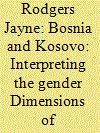

|
|
|
|
|
| Publication |
Dec 2001.
|
| Description |
183-195
|
|
|
|
|
|
|
|
|
|
|
|
|
|
|
|
| 6 |
ID:
021681
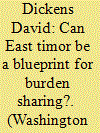

|
|
|
|
|
| Publication |
Summer 2002.
|
| Description |
29-40
|
|
|
|
|
|
|
|
|
|
|
|
|
|
|
|
| 7 |
ID:
023413
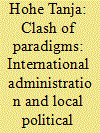

|
|
|
|
|
| Publication |
Dec 2002.
|
| Description |
569-689
|
|
|
|
|
|
|
|
|
|
|
|
|
|
|
|
| 8 |
ID:
110325
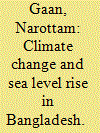

|
|
|
| 9 |
ID:
124130
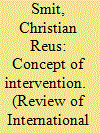

|
|
|
|
|
| Publication |
2013.
|
| Summary/Abstract |
Since the end of the Cold War, the number of books and articles on intervention in world politics has grown dramatically. Yet curiously little of this work subjects the concept of intervention itself to critical scrutiny. Scholars often preface their analyses with definitional discussions about what intervention is, but these definitions take a common form, conceiving intervention within a 'sovereignty frame'. This article questions this conception of intervention, arguing that it distorts our understanding of interventionary practices and forms of reasoning that occurred in non-sovereign international orders. After exploring the sovereignty framing of intervention in greater detail, I advance an alternative conception. International orders are systemic configurations of political authority: they comprise multiple units of such authority, each with its own realm of jurisdiction, organised according to some principle of differentiation. Importantly, this principle need not be territorial: it could be functional, for example. International intervention is the transgression of a unit's realm of jurisdiction, conducted by other units in the system. Unlike the sovereign framing of intervention, this conception is equally applicable to the interventionary ideas and practices of diverse international orders, and provides a better basis on which to understand how thinkers in different historical contexts have reasoned about intervention.
|
|
|
|
|
|
|
|
|
|
|
|
|
|
|
|
| 10 |
ID:
068212


|
|
|
| 11 |
ID:
073059
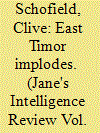

|
|
|
| 12 |
ID:
019546
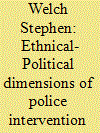

|
|
|
|
|
| Publication |
Spring 2001.
|
| Description |
104-124
|
|
|
|
|
|
|
|
|
|
|
|
|
|
|
|
| 13 |
ID:
131008
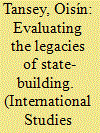

|
|
|
|
|
| Publication |
2014.
|
| Summary/Abstract |
What impact do international state-building missions have on the domestic politics of states they seek to build, and how can we measure this impact with confidence? This article seeks to address these questions and challenge some existing approaches that often appear to assume that state-builders leave lasting legacies rather than demonstrating such influence with the use of carefully chosen empirical evidence. Too often, domestic conditions that follow in the wake of international state-building are assumed to follow as a result of international intervention, usually due to insufficient attention to the causal processes that link international actions to domestic outcomes. The article calls for greater appreciation of the methodological challenges to establishing causal inferences regarding the legacies of state-building and identifies three qualitative methodological strategies-process tracing, counterfactual analysis, and the use of control cases-that can be used to improve confidence in causal claims about state-building legacies. The article concludes with a case study of international state-building in East Timor, highlighting several flaws of existing evaluations of the United Nations' role in East Timor and identifying the critical role that domestic actors play even in the context of authoritative international intervention.
|
|
|
|
|
|
|
|
|
|
|
|
|
|
|
|
| 14 |
ID:
052313
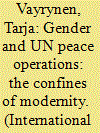

|
|
|
|
|
| Publication |
Spring 2004.
|
| Summary/Abstract |
The essay seeks to problematize the recent UN discourse on gender, peace and war by demonstrating how modernity sets the limits for the discourse, and therewith confines the discourse to the pre-given binary categories of agency, identity and action. It engages in an analysis of modernity and the mode of thinking that modernity establishes for thinking about war and peace. It is demonstrated in the text that new thinking on post-Westphalian conflicts and human security did open up a discursive space for thinking about gender in peace operations, but this space has not been fully utilized. By remaining within the confines of modernity, the UN discourse on peace operations produces neoliberal modes of masculinity and femininity where the problem-solving epistemology gives priority to the 'rationalist' and manageralist masculinity and renders silent the variety of ambivalent and unsecured masculinities and femininities
|
|
|
|
|
|
|
|
|
|
|
|
|
|
|
|
| 15 |
ID:
153992
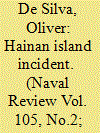

|
|
|
| 16 |
ID:
097421


|
|
|
|
|
| Publication |
DelhI, foundation Books, 2010.
|
| Description |
xxiii, 278p.
|
| Standard Number |
9788175967359, hbk
|
|
|
|
|
|
|
|
|
|
|
|
Copies: C:1/I:0,R:0,Q:0
Circulation
| Accession# | Call# | Current Location | Status | Policy | Location |
| 055049 | 327.172095986/ISH 055049 | Main | On Shelf | General | |
|
|
|
|
| 17 |
ID:
090436
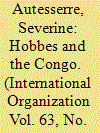

|
|
|
|
|
| Publication |
2009.
|
| Summary/Abstract |
Why do international peacebuilders fail to address the local causes of peace process failures? The existing explanations of peacebuilding failures, which focus on constraints and vested interests, do not explain the international neglect of local conflict. In this article, I show how discursive frames shape international intervention and preclude international action on local violence. Drawing on more than 330 interviews, multi-sited ethnography, and document analysis, I develop a case study of the Democratic Republic of Congo's transition from war to peace and democracy (2003-2006). I demonstrate that local agendas played a decisive role in sustaining local, national, and regional violence. However, a postconflict peacebuilding frame shaped the international understanding of violence and intervention in such a way that local conflict resolution appeared irrelevant and illegitimate. This frame included four key elements: international actors labeled the Congo a "postconflict" situation; they believed that violence there was innate and therefore acceptable even in peacetime; they conceptualized international intervention as exclusively concerned with the national and international realms; and they saw holding elections, as opposed to local conflict resolution, as a workable, appropriate, and effective tool for state- and peacebuilding. This frame authorized and justified specific practices and policies while precluding others, notably local conflict resolution, ultimately dooming the peacebuilding efforts. In conclusion, I contend that analyzing discursive frames is a fruitful approach to the puzzle of international peacebuilding failures beyond the Congo.
|
|
|
|
|
|
|
|
|
|
|
|
|
|
|
|
| 18 |
ID:
115198
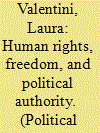

|
|
|
|
|
| Publication |
2012.
|
| Summary/Abstract |
In this article, I sketch a Kant-inspired liberal account of human rights: the freedom-centred view. This account conceptualizes human rights as entitlements that any political authority-any state in the first instance-must secure to qualify as a guarantor of its subjects' innate right to freedom. On this picture, when a state (or state-like institution) protects human rights, it reasonably qualifies as a moral agent to be treated with respect. By contrast, when a state (or state-like institution) fails to protect human rights, it loses its moral status and becomes liable to both internal and external interference. I argue that this account not only steers a middle course between so-called natural-law and political approaches to human rights but also satisfies three important theoretical desiderata-explanatory power, functional specificity, and critical capacity.
|
|
|
|
|
|
|
|
|
|
|
|
|
|
|
|
| 19 |
ID:
084020
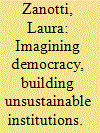

|
|
|
|
|
| Publication |
2008.
|
| Summary/Abstract |
This article employs theoretical tools devised by Michel Foucault to explore the political rationale, technologies of government, and unintended consequences of UN efforts at statebuilding and democratization in the context of the peacekeeping operation in Haiti. It aims to offer an empirically oriented contribution to the study of the modalities of international intervention in the post-Cold War period and the effects of transplanting institutional models. The article shows that the UN's political imaginary can be traced back to the texts that guided the reform of punishment institutions in Classical Europe. The United Nations saw its effort at statebuilding as centered upon making local institutions disciplined, visible, and centralized. The failure of the UN to achieve its stated goals is appraised in the contingent modalities of the encounter between an ethnocentric political imaginary that takes for granted that modalities of government can be transplanted with benign effects and local conditions of extreme poverty. The article concludes that, while purporting to build an independent, democratic, and well-functioning state, unreflectively imported political models foster disorder and dependence. They also reinforce the instruments of control and conditionality in the hands of international actors, thus fostering the carceralization of international spaces.
|
|
|
|
|
|
|
|
|
|
|
|
|
|
|
|
| 20 |
ID:
133140
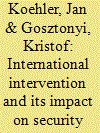

|
|
|
|
|
| Publication |
2014.
|
| Summary/Abstract |
The challenge of building a security sector effective in terms of protecting the population and the state from challengers, and which at the same time fulfils minimum standards of good governance, was a daunting one in Afghanistan. These difficulties were compounded by what in hindsight seem to be obvious mistakes on the part of the intervention. In our paper, we investigate how security sector building fared under such adverse conditions in north-east Afghanistan. We find that in spite of the formidable challenges and the mistakes made by the international intervention, it did not fail completely. Neither did it succeed. Based on the results of quantitative surveys and qualitative research, we suggest that (a) the international intervention was partly successful in building up Afghan National Security Forces - both as a fighting force and in terms of security sector institutions that are restrained to some extent by the rule of law; (b) the problems caused by setting up informal local militias (violent feuds, criminality, human rights abuses and extortion of the population) could be partly mitigated by transforming them into an official local police programme.
|
|
|
|
|
|
|
|
|
|
|
|
|
|
|
|
|
|
|
|
|